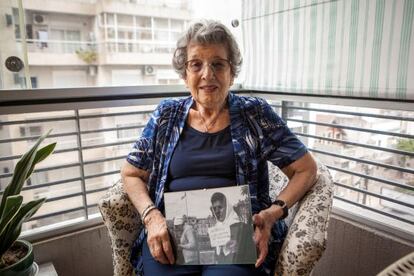A chance to pick up where they left off, 39 years on
One of the founders of Grandmothers of Plaza de Mayo has located her grandson


Delia Giovanola will never forget the moment when they told her that her grandson was on the other end of the line. “Do you know what it’s like to fly like a dragonfly at 89 years old?” She laughs as she remembers the way she ran to the phone. She had been looking for him for 39 years. She and her other granddaughter, Virginia, Martín’s sister, looked everywhere. For years, he suspected he was the son of victims of forced disappearances but he could not muster up the courage to go and see the Grandmothers of Plaza de Mayo. Since 1976, while the regime was still in power, the Argentinean organization has been searching for children who were born while their mothers were in captivity.
Martín knew but he was waiting. He did not want to see the parents who raised him ripped apart. They registered him as adopted and they did not have any direct role in the regime. He waited for them to die. His father passed away in March, and then three months later, his mother. It was the sign. He went to the group and they confirmed that he was the grandson of Giovanola, one of the organization’s 12 founding members. He is grandchild number 118. There are 350 more still to find.
He is grandchild number 118. There are 350 more still to find
The stories surrounding victims of forced disappearances are always painful. Although Delia and Martín are happy and speak almost every day via Skype, Virginia committed suicide in 2011 and never got to meet her brother. “While looking for a grandson, I lost a granddaughter,” Delia says. “Virginia took her life. She suffered severe depression, another consequence of the dictatorship.” Before she died, she underwent a DNA test, and those documents were used to prove that Martín was her brother, with a 99.9-percent probability.
These two women’s struggle was seen around the world in the documentary Hermanos de sangre. Virginia was three years old when the military arrested her father and pregnant mother. At first, her grandmother would take her to the marches in Plaza de Mayo square. “I didn’t have anyone to leave her with, we were alone, her father was an only child. She would play with the doves. Until it got rough. The soldiers threatened us with guns and I stopped taking her.”
At 18 years old, Virginia made the search for her brother her life’s mission. She wrote eight letters to Martín that show how much the loss of her brother hurt her. He has seen the documentary, read the letters and he feels a little guilty, Delia says. He thinks that if he had approached them sooner, maybe he could have saved Virginia.
But Delia does not want to think that way. She prefers to focus on the good news. She has a grandson and two great granddaughters to enjoy, even if it is from a distance. Martín has been living overseas for 15 years. “My father’s name is not Martín,” one of her great granddaughters says via Skype. Delia explains to her that she called him Martín 39 years ago when she began looking for him. He doesn’t mind being called Martín. Delia knows everything will take time to fall into place.
He is well and she only wants to hug him. She hopes to meet him at Christmas. She speaks as if she were reliving her youth again. “I don’t want to bombard him with questions. I only know that he was very happy with the parents who raised him, that he has had a full life. He is the one who bombards me; he wants to know everything. I am rummaging in boxes because he wants color pictures of his father, mother and sister. He is completely open. I am living a dream.”
After 39 years, the circle is now complete.
English version by Dyane Jean Francois.
Tu suscripción se está usando en otro dispositivo
¿Quieres añadir otro usuario a tu suscripción?
Si continúas leyendo en este dispositivo, no se podrá leer en el otro.
FlechaTu suscripción se está usando en otro dispositivo y solo puedes acceder a EL PAÍS desde un dispositivo a la vez.
Si quieres compartir tu cuenta, cambia tu suscripción a la modalidad Premium, así podrás añadir otro usuario. Cada uno accederá con su propia cuenta de email, lo que os permitirá personalizar vuestra experiencia en EL PAÍS.
¿Tienes una suscripción de empresa? Accede aquí para contratar más cuentas.
En el caso de no saber quién está usando tu cuenta, te recomendamos cambiar tu contraseña aquí.
Si decides continuar compartiendo tu cuenta, este mensaje se mostrará en tu dispositivo y en el de la otra persona que está usando tu cuenta de forma indefinida, afectando a tu experiencia de lectura. Puedes consultar aquí los términos y condiciones de la suscripción digital.








































